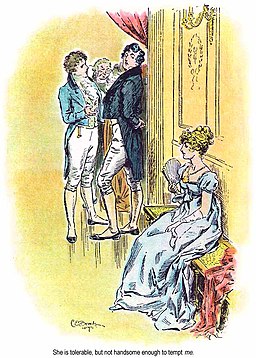What do Pride and Prejudice, honesty and beta reading have in common? Read on to find out!

Imagine a sliding scale of tact. At one end, total blunt honesty with complete disregard for feelings. At the other, spineless appeasing sugar-coated honeydrops. Where do you fit on the scale? This handy quiz will tell you.
Question 1: do I look fat in this?
Answer:
a) Darling, you look lovely!
b) Is that you? I thought it was an elephant.
c) I’m afraid it doesn’t flatter your figure.

Question 2: have I offended you?
Answer:
a) No… I’m not offended.
b) Of course you *%^#& have!
c) Yes – can we talk about it?
Question 3: does this colour suit me?
Answer:
a) You look wonderful in everything!
b) You look like you’re dying of some grotesque disease.
c) I think […..] might be a better look.
Question 4: wouldn’t you agree?
Answer:
a) Oh, definitely.
b) No, because I’m not a brain-dead moron!
c) No, actually. I think….

Question 5: do you like my new boyfriend/girlfriend?
Answer:
a) I’m delighted for you – I’m sure you’ll be so happy!
b) S/he is the most repellent person I’ve ever met – you are literally insane, you know that?
c) I don’t know that this is the best relationship for you.
And now to the scoring! Give yourself:
3 points for every time you answered A;
1 point for every time you answered B;
and 2 points for every time you answered C.
If your total is 5-8 points: you are Lady Catherine de Bourgh.
 Remember, truth is like a stick: you can use it to support someone, or hit them over the head (and sore heads don’t take much in). Sometimes you have to choose between making a point and making a difference.
Remember, truth is like a stick: you can use it to support someone, or hit them over the head (and sore heads don’t take much in). Sometimes you have to choose between making a point and making a difference.
If your score is 13-15 points: you are Mr Collins.

Insincerity devalues your contribution, as people have no idea what you are really thinking. It’s nice to want people to feel good, but when it comes down to it, people won’t believe you if they can’t trust you to be honest.
If your total rests between 9-12 points: you are Elizabeth Bennet, who goes to the effort of uniting civility and truth. Just the friend we all want, in fact: someone who will tell it like it is without unnecessarily hurting our feelings.
 So to you Elizabeths, I have a proposal to make (blush). Might I interest you in being a beta reader for my WIP? The task is not onerous: it consists of reading the text and telling me what you liked and what you didn’t like, if you got bored and where, and any other ways you think the book could be improved.
So to you Elizabeths, I have a proposal to make (blush). Might I interest you in being a beta reader for my WIP? The task is not onerous: it consists of reading the text and telling me what you liked and what you didn’t like, if you got bored and where, and any other ways you think the book could be improved.
If you’re interested, put your hand up in the comment section and I’ll get in touch. The text should be ready in a couple of weeks, and you’ll have about a month to read and reply. In return, you get the first look at the novel (pre-publication) and your name in the acknowledgements (post-publication) – plus of course my undying gratitude, goodwill etc (firstborn child not included).
Restoration Day
Lily has been raised to be the perfect fairytale princess, in her enchanted castle on the edge of a magical land. But when the chance for a quest arises and she descends from her castle, she finds that all is far from perfect in her fairytale kingdom.
Before she knows it she is running for her life (princesses never run) and learning that being a princess is a far cry from being the queen her land so desperately needs. Her quest is deadly serious now: if she doesn’t find the regalia in time for Restoration Day, the land will be lost forever – and so will she.





